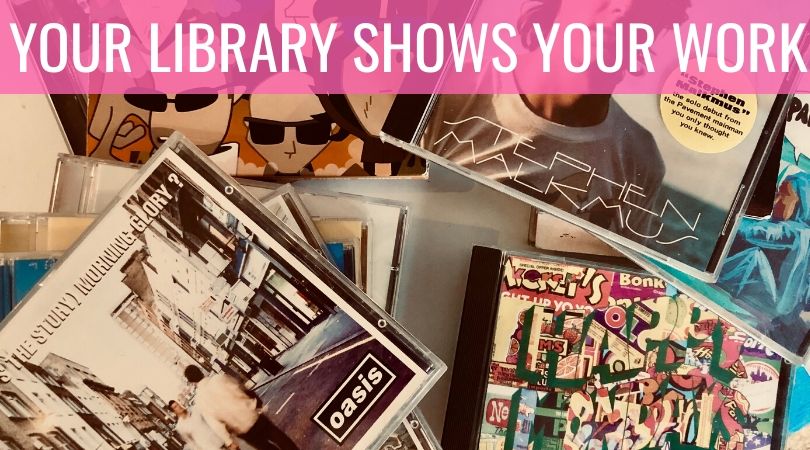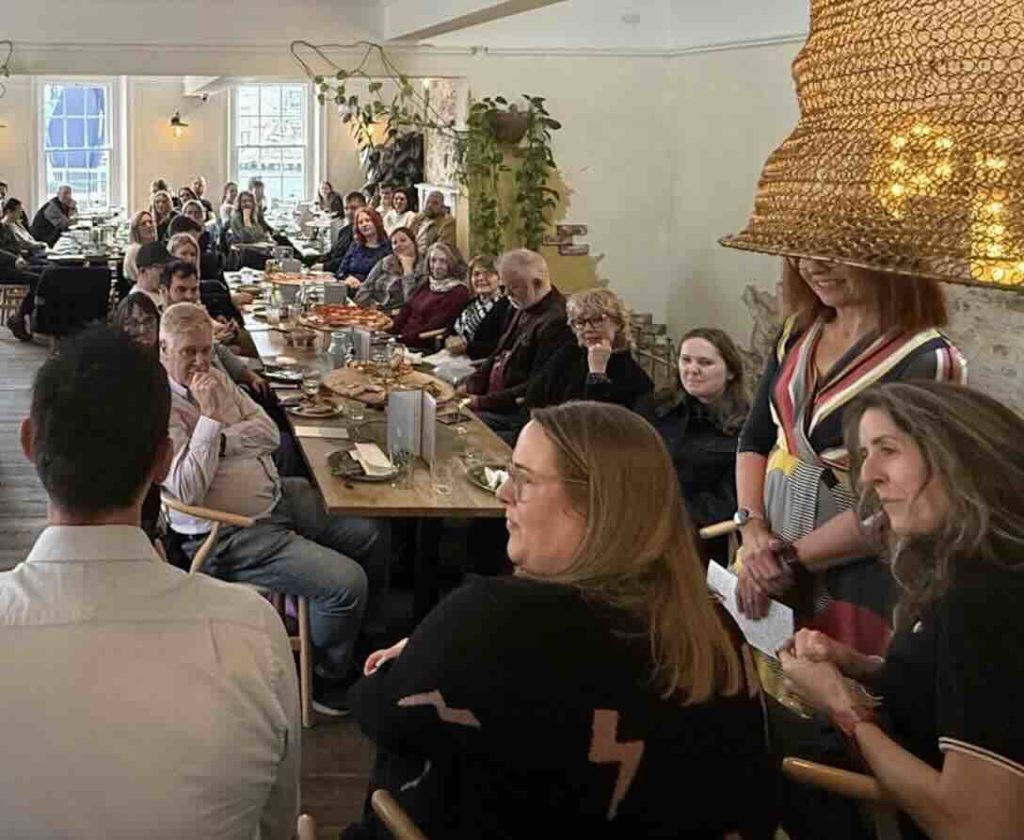Let’s learn and create together!
Book your placeYour Library Shows Your Work And Proves Your Worth

Over time, the content you create will become an integral part of your brand. This will translate into better and more opportunities for you.
The very act of developing a library of work, built around your central narrative, means that you create better work for others, as well as for yourself.
This article is all about the library of work you create. It’s about digging deep, doing the work and building the narrative that shapes you as a business and as a person, over a period of time.
Look at it this way – to make your greatest hits album, you first have to put in the work that makes up all the other albums. With content, all too many people fall into the trap of thinking they can go straight to their greatest hits without the equivalent of playing the smaller gigs, getting through that difficult second album and incrementally building a following.
Making that effort to create and post content regularly, and building a body of work makes it easier for people to follow you and become a part of the rhythm you establish.
What Does Building Your Library Mean?
A library of work sits as a key part of a community for others to become a part of, interact with and perhaps most importantly, learn from.
Building your library means developing your message within your blog, podcast or video – where you start out without having a particular end point in mind and where, over time your work starts to be shared and becomes a point of reference for others who feel at ease in your space.
As you build, you’ll probably find that recognition isn’t instantaneous but this should never mean that you throw in the towel. It’s at this stage, when you’re doing the work, that you start to become more comfortable with your voice and develop responsibility for sharing your ideas and bringing people together – this could be new clients coming to your business, or something that’s more community-led.
Building trust and getting closer to the people you’re writing for is another important element – sharing what hurts and what didn’t work is just as important as documenting successes.
Other reasons building this library of work benefits you:
— Practice and reflection drive you to create better work
— It’s proof that you show up, and don’t hide or shy away
— You’re constructing a living CV for all to see
It’s Better When It Doesn’t Become Forced
In his book Fanocracy, David Meerman Scott shares the importance of creating a feeling of proximity. This means your work encourages personal interaction. A library of work is the connector that helps the conversation along, facilitating flow back and forth, and sharing.
I like the idea that you can reach out to someone and say, “I thought you might like to read/watch/listen to this” and send them something you’ve produced yourself.
This also means you’re not forcing yourself on your audience through say, Facebook Ad-spend yet you’re still effectively promoting your work and taking it to a very personal, one-to-one level. Strength comes from the library you build, neither automated, nor forced, it feels personal and close.
Things you have to accept along the way:
— Recognise you’ll never be the finished article. Your library is, and should always be, a work in progress that stays true to your values but is constantly evolving. You have to be ok with sharing your imperfections and work that isn’t perfect. Don’t take so much time creating the perfect piece of work that you find your audience has moved on to look at something or someone else.
— Plan and allow yourself enough time to create your work. To keep going you need to make the process disciplined but enjoyable so you’re free to do your best work. What you don’t want to get into is a situation where you’re forced to cobble pieces together hastily to meet the demands of your schedule.
— If you share something that doesn’t sound, feel, look like you, things get out of kilter. Mix it up, reflect life as it happens – what works, what doesn’t, why something bombed or why it did well – this makes your content relatable and doesn’t paint a false picture.
How Do You Start Building That First Row Of Content In Your Library?
Everything starts from doing just one thing; it builds from there and works like this:
— Identify the medium you’re most comfortable with. In my case, this was writing, mainly because it was easy to return to, to edit and adapt before sharing. The major investment when I started this properly in 2013 was time
— Develop your work and find your flow in this medium before you tackle other outlets like say, video or podcasting.
— When the time feels right, you can then branch out into that other medium. For me, this meant developing audio content and then events.
— In this way your library (i.e. body of work) offers a space for listening and watching as well as reading. In the case of YATM it also became a way of meeting people in real life.
Don’t Forget To Promote Your Work
Creating work that sits quietly unread or unheard, that no one ever sees, is not the objective.
To get others to visit and spend time in your library you need to identify the channels that will bring people to you. For instance, if you choose to make written content, Medium and LinkedIn are great at supporting your activity and helping you with reach.
What Happens When Your Library Becomes Established?
Over time, as you build your body of work opportunities will present themselves.
Sometimes, just letting others know that you are there for them is far more important than wanting to be seen as the expert.
The longer you stick with it, the easier it will become to build relationships with others via your work. Let me highlight the return and impact that can flow to you and your business, you can read here:
— Be ok with what you present.
You don’t have to have the definitive answer to everything. You’re not always right. The more you lean in, the more you can return to a topic again and again. For instance, over the past couple of years, figuring out why people make a decision to come to live events has fascinated me. I’ve got better at fine-tuning this the more events I’ve done, but I still don’t have the answer.
— People can see your intent.
You want others to see that you care and that the topics you’re vocal about and share, align with the commercial side of your business. The reason you share has to be more about the values you have, not just because it ticks an SEO requirement.
— It’s important and helpful to show your thinking, in the moment.
Why wait for the moment to pass when you can document and share whilst you are living in the now? (Evernote is a brilliant tool for jotting down ideas). For instance, the new, live YATM Bristol events are on the horizon – I’ve concentrated on trying to figure out why only a few months ago their launch had to be postponed due to lack of interest and yet now they’ve sold out well in advance. You can read that article here.
— It leads to other trains of thought.
What starts in one place can then be used to build a whole new series of articles, a long-read White Paper or PDF, a presentation, or even a book. When I published The Content Revolution in 2015, a lot of the thinking and words came from my existing writing.
— Your work becomes a public CV for your business and for you.
By showing you are current with your thinking, the library you build over time becomes something that proves your marketability.
Let’s Round-Up
Your library of work demonstrates your generosity – your work can be found and your learnings, shared.
A body of work that aligns with what you do as a business proves that spending time with you, in your virtual space (and then also possibly In Real Life), is time well spent. You’re someone who’s in it for the long haul – your plentiful resources and willingness to share the ups and downs authentically testify to that.
Too many people give up too soon. The library you start building, that you regularly add to over time, is a powerful way to become a part of the fabric of someone else’s week, month or year, and it means you’re constantly learning too.
LET ME READ THIS ARTICLE TO YOU, CLICK BELOW.
Podcast: Play in new window | Download

Build Your Community
A brand new programme from Mark Masters for businesses wanting to make that next growth step.
Find out moreYATM Club
Where non-conformist business owners come to work, learn and make friends. Click here

